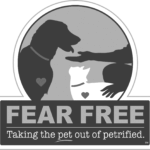“My Breeder Said”
July 12, 2015
There are three words that every veterinarian dreads: “My breeder said…” Fortunately, a good majority of owners these days rescue their new dog from a shelter or foster group. Certain clients are very loyal to specific breeds, and will elect to buy a new puppy from a breeder. There are some really good breeders out there (I heard recently from a client who came in with a newly purchased Labrador puppy that her breeder bred only one litter per year, had both parents thoroughly screened for hip dysplasia, insisted on checking that all adoptive pet owners have veterinary references and even did a home inspection to ascertain that the pups were going to a safe, clean responsible home!) Unfortunately, responsible breeders are very much the exception rather than the rule. I’ve talked previously about backyard breeders and puppy mills, which is not the topic of today’s post.
Dog and cat breeders can be experts to a certain degree. Responsible breeders devote their lives to one particular breed of dog or cat, and get to know the pros and cons of the breed better than anyone else. Breeders of uncommon breeds such as the Swedish Vallhund or the Chinook, for example, certainly know more about the temperament, coat characteristics, training and behavior of their particular dogs than most veterinarians. That, however, should be the extent of the “expertise” shared by breeders with adoptive pet parents. There are rare exceptions to this, but the average breeder has no scientific or medical training whatsoever.
All too frequently, clients bring in their newly purchased puppy with a list of medical recommendations from the breeder. The list can be short and sweet (as in, “Make sure to bring your new puppy to the veterinarian within seven days of purchase”) or lengthy and filled with medically inappropriate and inaccurate suggestions.
What are the most common inaccuracies that breeders share with new pet owners?
1.) “This breed is very sensitive to X, Y or Z vaccine and should never receive that vaccination.” There is no scientific data to support the idea that some breeds are more allergic or reactive to specific vaccinations than others. Vaccine protocols are determined by the age and lifestyle of the pet, not by their breed. The same goes for anesthetic drugs and most other medications, with some notable exceptions.
2.) “Your dog should not be vaccinated for rabies until they are six months old.” The law in Pennsylvania states that all kittens and puppies are required to be vaccinated for rabies between 12 and 16 weeks of age. That is the law, and not up for debate.
3.) “This breed should only be fed a raw diet or else they will develop cancer/diarrhea/allergies/spontaneous amputation of the limbs.” The Centers for Disease Control and the AVMA have taken a definitive position against raw diets, due to the risk of salmonella and E.coli toxicity to pets being fed these foods. There is also a risk that owners can become ill from the pathogens found in raw diets, simply by handling these foods or by contacting the fecal matter of animals fed a raw diet.
4.) “Your dog should have at least one heat cycle before she’s spayed”. Numerous scientific studies have determined a direct link between the number of estrous (heat) cycles a dog or cat has, and their increased risk for mammary (breast) cancer development. Even one heat cycle can predispose your pet to breast cancer, while spaying before the first heat can eliminate the risk of this deadly disease.
5.) “This breed doesn’t get fleas”, or “Flea and tick products will give this breed cancer.” I’ve said to clients a million times over: I’ve seen dogs die from complications related to Lyme disease, and I’ve seen kittens that need blood transfusions due to severe flea bite anemia, but I’ve never seen a pet who developed cancer as a direct result of parasite prevention usage. And no breed is immune to fleas! C’mon, really?
6.) “Your dog needs vitamins/other nutritional supplements.” I’ve heard of breeders selling clients expensive vitamins, and enrolling new dog owners in automatic delivery of supplements for the first year of their pet’s life. This is a pyramid scheme! If your pet is eating dog or cat food, that pet food is required by AAFCO (the American Association of Feed Control Officials) to meet one hundred percent of your pet’s nutritional needs. Nutritional deficiencies are not a concern in animals being fed quality pet foods; however, over-supplementation of some nutrients found in vitamins can lead to health problems.
There are many more inaccurate and even dangerous recommendations made from breeders to well-meaning and unsuspecting new dog owners. Here is the reality: the only thing that qualifies a breeder to be a breeder is to own an intact male and an intact female dog. That’s it. Contrast that to your veterinarian, who has a minimum of four years of undergraduate and four years of graduate training in biology, microbiology, immunology, anatomy, physiology, biochemistry, histology, genetics, nutrition, and myriad other specialities. Breeders can provide valuable training and housebreaking advice for new puppies, but they should not be relied upon for medical advice in any capacity whatsoever. When in doubt, call your veterinarian for medical advice!



